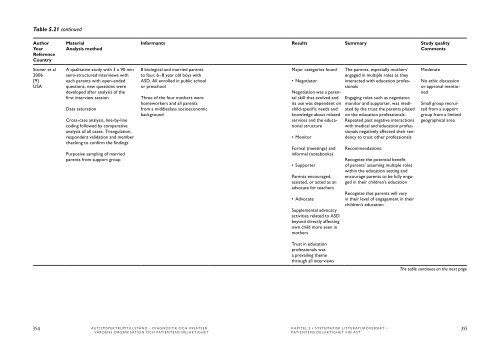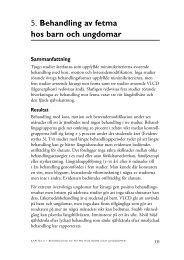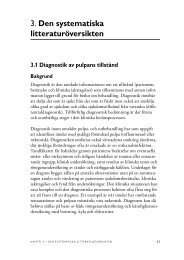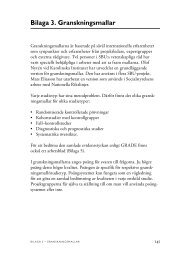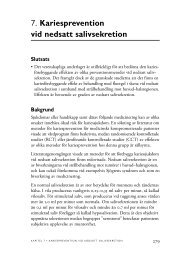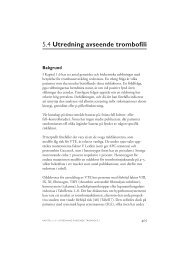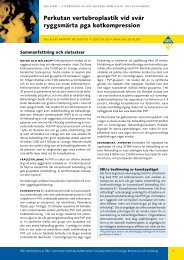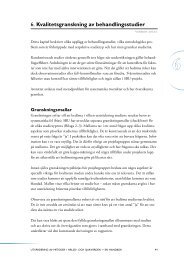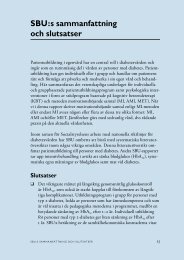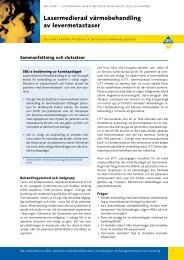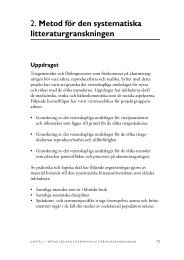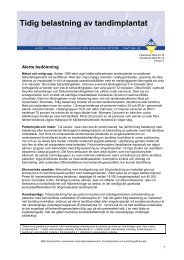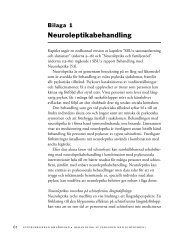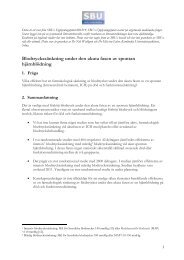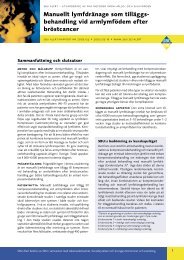Rapporten - SBU
Rapporten - SBU
Rapporten - SBU
Create successful ePaper yourself
Turn your PDF publications into a flip-book with our unique Google optimized e-Paper software.
Table 5.21 continued<br />
Author<br />
Year<br />
Reference<br />
Country<br />
Stoner et al<br />
2006<br />
[9]<br />
USA<br />
Material<br />
Analysis method<br />
A qualitative study with 3 x 90 min<br />
semi-structured interviews with<br />
each parents with open-ended<br />
questions, new questions were<br />
developed after analysis of the<br />
first interview session<br />
Data saturation<br />
Cross-case analysis, line-by-line<br />
coding followed by comparative<br />
analysis of all cases. Triangulation,<br />
respondent validation and member<br />
checking to confirm the findings<br />
Purposive sampling of married<br />
parents from support group<br />
Informants Results Summary Study quality<br />
Comments<br />
8 biological and married parents<br />
to four, 6–8 year old boys with<br />
ASD. All enrolled in public school<br />
or preschool<br />
Three of the four mothers were<br />
homeworkers and all parents<br />
from a middleclass socioeconomic<br />
background<br />
354 Autismspektrumtillstånd – diAgnostik och insAtser,<br />
KAPITEL 5 • sysTEmATIsK LITTErATurövErsIKT –<br />
355<br />
vårdens orgAnisAtion och pAtientens delAktighet<br />
Major categories found<br />
• Negotiator<br />
Negotiation was a parental<br />
skill that evolved and<br />
its use was dependent on<br />
child-specific needs and<br />
knowledge about related<br />
services and the educational<br />
structure<br />
• Monitor<br />
Formal (meetings) and<br />
informal (notebooks)<br />
• Supporter<br />
Parents encouraged,<br />
assisted, or acted as an<br />
advocate for teachers<br />
• Advocate<br />
Supplemental advocacy<br />
activities related to ASD<br />
beyond directly affecting<br />
own child more seen in<br />
mothers<br />
Trust in education<br />
professionals was<br />
a prevailing theme<br />
through all interviews<br />
pAtientens delAktighet vid Ast<br />
The parents, especially mothers’<br />
engaged in multiple roles as they<br />
interacted with education professionals<br />
Engaging roles such as negotiator,<br />
monitor and supporter, was mediated<br />
by the trust the parents placed<br />
on the education professionals.<br />
Repeated past negative interactions<br />
with medical and education professionals<br />
negatively affected their tendency<br />
to trust other professionals<br />
Recommendations:<br />
Recognize the potential benefit<br />
of parents’ assuming multiple roles<br />
within the education setting and<br />
encourage parents to be fully engaged<br />
in their children’s education<br />
Recognize that parents will vary<br />
in their level of engagement in their<br />
children’s education<br />
Moderate<br />
No ethic discussion<br />
or approval mentioned<br />
Small group recruited<br />
from a support<br />
group from a limited<br />
geographical area<br />
The table continues on the next page


